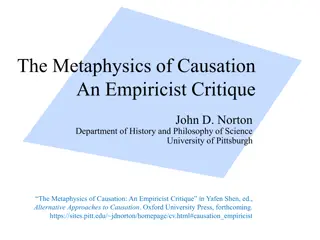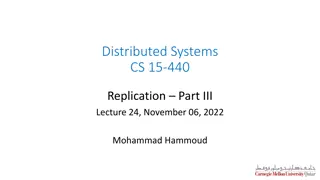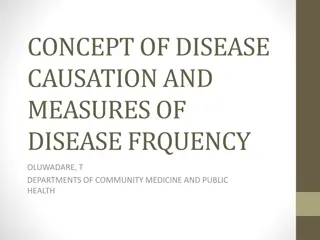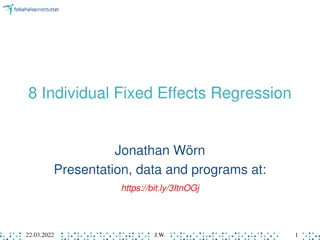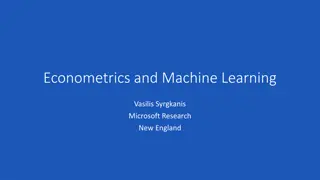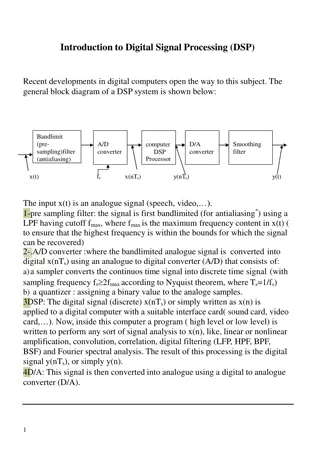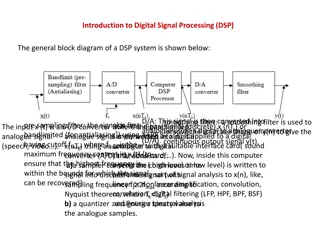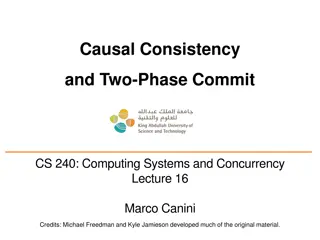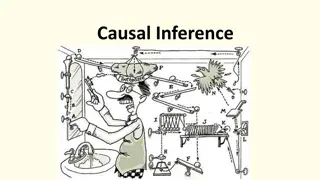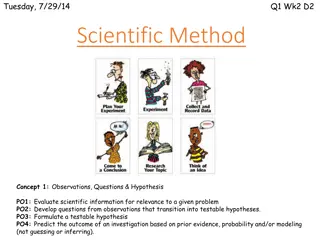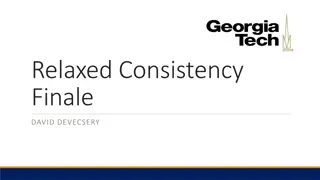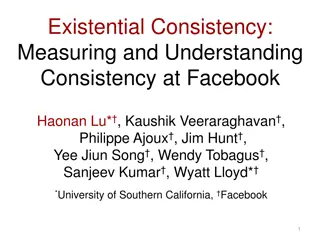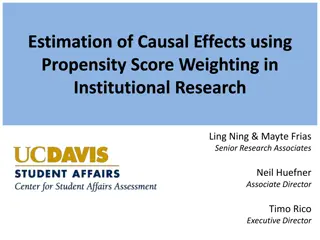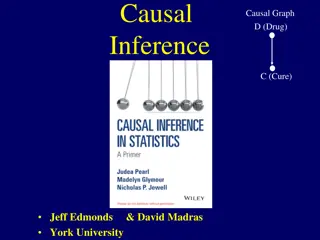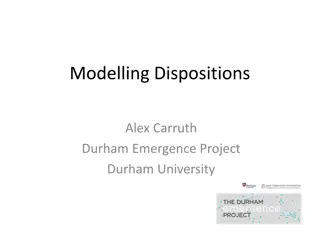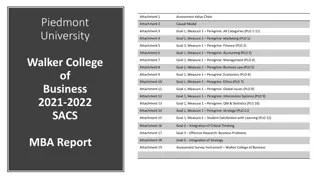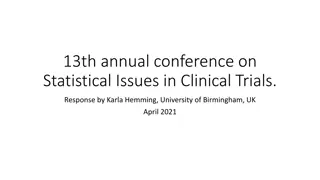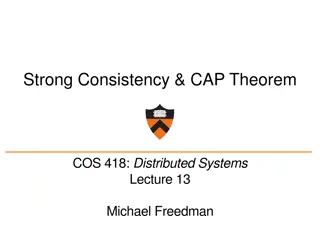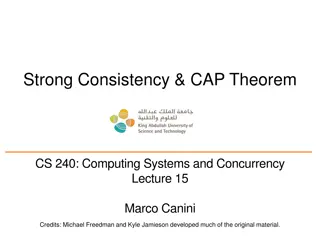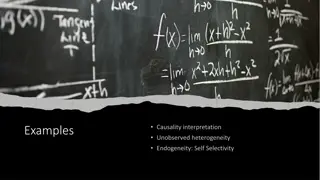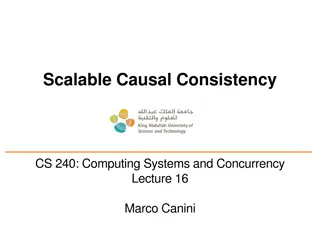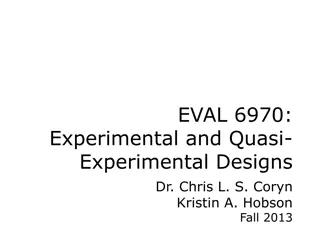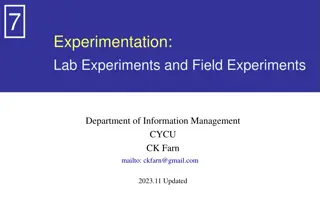Critique of Causal Metaphysics and Empiricism
In this content, the author critiques the metaphysics of causation from an empiricist perspective, exploring the limitations of empiricism in understanding the contingent truths of the world. It discusses causal antifundamentalism, various forms of skepticism, including Humean skepticism, and challe
4 views • 55 slides
Optimizing Homework Effect on Student Achievement Through Causal Machine Learning
Using TIMSS 2019 data from Ireland, a study conducted at Maynooth University explores the impact of homework frequency, duration, and question types on student achievement in math and science. By leveraging causal machine learning techniques, researchers aim to provide insights for educators on effe
0 views • 31 slides
Understanding Association and Causation in Epidemiological Studies
Exploring the concepts of association and causation in epidemiological studies, this content delves into the complexities of determining if exposure leads to disease risk. It discusses different types of associations, such as spurious, indirect, and direct causal associations, illustrating the chall
5 views • 43 slides
Understanding Consistency Protocols in Distributed Systems
Today's lecture covers consistency protocols in distributed systems, focusing on primary-based protocols and replicated-write protocols. These protocols play a crucial role in ensuring consistency across multiple replicas. One example discussed is the Remote-Write Protocol, which enforces strict con
0 views • 35 slides
Understanding Disease Causation and Frequency Measures
The concept of disease causation delves into the factors that play a role in the development of diseases, emphasizing the importance of studying causation for prevention, control, and treatment. To infer causation, certain conditions must be met, and a causal relationship is characterized by associa
0 views • 47 slides
Understanding Fixed Effects Regression for Causal Inference in Social Research
Explore the concept of fixed effects regression for obtaining causal estimates with observational data, focusing on the association between social participation and depressive symptoms. Discover how this method controls for time-invariant factors and eliminates confounding variables, providing a clo
0 views • 49 slides
Introduction to Econometrics and Machine Learning
Econometrics and machine learning intersect in decision-making scenarios where causal and counterfactual questions arise. This talk explores the relationship between the two fields, highlighting the identification of causal quantities and the flexible estimation techniques employed. Examples demonst
1 views • 53 slides
Targeted Learning Framework for Causal Effect Estimation Using Real World Data
Hana Lee, Ph.D., presents a webinar on the Targeted Learning Framework for Causal Effect Estimation using Real World Data (TMLE). The project aims to help the FDA develop a structured approach to incorporating real-world data into regulatory decision-making. TMLE offers a systematic roadmap aligned
0 views • 27 slides
Understanding the Process and Types of Research Design
The process of research design involves interactive stages occurring simultaneously, leading to the creation of a structured study. There are three main types of research design: exploratory, descriptive, and experimental (or causal). Each type has its own objectives and methods. Exploratory researc
0 views • 7 slides
Understanding Research Methods: Quantitative, Qualitative, and Mixed Approaches
This introduction provides an overview of qualitative, quantitative, and mixed methods research, highlighting key differences and various types of research approaches. It delves into exploratory, descriptive, and causal research methodologies, offering insights into problem discovery, data collectio
0 views • 50 slides
Overview of Digital Signal Processing (DSP) Systems and Implementations
Recent advancements in digital computers have paved the way for Digital Signal Processing (DSP). The DSP system involves bandlimiting, A/D conversion, DSP processing, D/A conversion, and smoothing filtering. This system enables the conversion of analog signals to digital, processing using digital co
1 views • 24 slides
Understanding Directed Acyclic Graphs (DAGs) for Causal Inference
Directed Acyclic Graphs (DAGs) play a crucial role in documenting causal assumptions and guiding variable selection in epidemiological models. They inform us about causal relationships between variables and help answer complex questions related to causality. DAGs must meet specific requirements like
1 views • 63 slides
Understanding Digital Signal Processing (DSP) Systems: Linearity, Causality, and Stability
Digital Signal Processing (DSP) involves converting signals between digital and analog forms for processing. The general block diagram of a DSP system includes components like D/A converters, smoothing filters, analog-to-digital converters, and quantizers. DSP systems can be classified based on line
1 views • 12 slides
Understanding Causal Consistency in Distributed Systems
This content covers the concept of causal consistency in computing systems, exploring consistency models such as Causal Linearizability and Eventual Sequential. It explains the importance of logical clocks like Lamport and vector clocks, and how they ensure order in distributed systems. The concept
0 views • 35 slides
Scalable Causal Consistency for Wide-Area Storage with COPS
This paper delves into the importance of scalable causal consistency for wide-area storage with the COPS system. It explores desired properties such as availability, low latency, partition tolerance, and scalability within data centers. The document discusses the challenges of achieving consistency
0 views • 41 slides
Understanding Causal Inference and Scientific Goals
Explore the significance of causal inference in science, the goals of scientific research, and the importance of developing an understanding of causal associations. Delve into topics like causal pattern recognition, mechanistic understanding, and potential outcomes frameworks to enhance your underst
0 views • 76 slides
Understanding the Scientific Method: Observations, Questions, and Hypotheses
Explore the scientific method concept of making observations, asking questions, and forming hypotheses. Learn the difference between causal and descriptive questions and practice applying them. Understand how to approach a situation like a non-starting washing machine through causal and descriptive
0 views • 28 slides
Memory Consistency Models and Sequential Consistency in Computer Architecture
Memory consistency models play a crucial role in ensuring proper synchronization and ordering of memory references in computer systems. Sequential consistency, introduced by Lamport in 1979, treats processors as interleaved processes on a shared CPU and requires all references to fit into a global o
1 views • 64 slides
Discussions on Programmers' Needs, Memory Models, and Consistency in Software Development
Today's discussions covered various topics including what programmers require, the debate on defining memory models for achieving Sequential Consistency (SC), considerations for data-race-free programs, and the performance trade-offs of weaker memory architectures. Insights into partial and relaxed
2 views • 22 slides
Understanding Consistency at Facebook: A Study on Existential Consistency
This study explores the measurement and comprehension of consistency at Facebook, focusing on existential consistency. Key topics covered include consistency performance, fundamental tension between consistency and performance, anomalies in Facebook systems, and strategies for quantifying and preven
0 views • 30 slides
Estimation of Causal Effects using Propensity Score Weighting
Understanding causal effects through methods like propensity score weighting is crucial in institutional research. This approach helps in estimating the impact of various interventions, such as a writing program, by distinguishing causation from correlation. The use of propensity score matching aids
0 views • 22 slides
Understanding Causal Inference and Causal Graphs in Drug Efficacy Studies
This content delves into the concept of causal inference using causal graphs, specifically focusing on the relationship between a drug (D) and its effectiveness in curing a condition (C). It discusses the importance of distinguishing correlation from causation and explores scenarios where confoundin
0 views • 66 slides
Understanding Causal Factors in Illness: Toxins, Smoking, and Contributing Causes
Causal standards for illness attribution, toxins' role in disease onset and expression, and the impact of factors like smoking and contributing causes on health outcomes are explored. The distinction between certain and contributing causes, as well as the level of certainty in carcinogen classificat
1 views • 19 slides
Enhancements in Causal Forecasting: SPM 11.0.1/11.1 Overview
Key enhancements in SPM 11.0.1/11.1 focus on improving forecast accuracy through variable history slices, causal forecasting for multiple streams, multi-threading capabilities, easy access to product rollout and causal value pages, and more. The Next Gen Causal Forecasting introduces additional feat
0 views • 6 slides
Understanding Dispositions: The Conditional Analysis Approach
Explore the concept of dispositions, also known as capacities or causal powers, and the traditional Conditional Analysis (CA) approach as a dominant account of dispositions. Learn about the features and examples of dispositions such as fragility, solubility, mass, and charge, and how objects exhibit
0 views • 25 slides
MBA Program Assessment and Causal Model Analysis: Insights and Integration
Delve into the assessment value chain of the 2021-2022 MBA Report, exploring inputs, outcomes, impacts, and outputs to measure student learning outcomes and satisfaction. Analyze the causal model relationships affecting student satisfaction with learning, aiming to enhance outcomes and impacts for i
0 views • 13 slides
Stronger Semantics for Low-Latency Geo-Replicated Storage
Discusses the importance of strong consistency and low latency in geo-replicated storage systems for improving user experience and revenue. Various storage dimensions, sharding techniques, and consistency models like Causal+ are explored. The Eiger system is highlighted for ensuring low latency by k
0 views • 24 slides
Statistical Issues in Clinical Trials: Insights from 13th Annual Conference
The 13th annual conference on Statistical Issues in Clinical Trials covered topics such as penalties for extra variation and limited degrees of freedom, the Diet-Heart Hypothesis, controlled trials, unit of randomization, and causal inference. Speakers highlighted the importance of addressing cluste
0 views • 10 slides
Understanding Strong Consistency and CAP Theorem in Distributed Systems
Strong consistency and the CAP theorem play a crucial role in the design and implementation of distributed systems. This content explores different consistency models such as 2PC, consensus, eventual consistency, Paxos, and Raft, highlighting the importance of maintaining ordering and fault-toleranc
0 views • 29 slides
Understanding Strong Consistency and CAP Theorem
Explore the concepts of strong consistency, CAP theorem, and various consistency models such as 2PC, consensus, eventual consistency, Paxos, Raft, and Dynamo. Learn about fault-tolerance, durability, and the importance of correct consistency models in distributed systems. Understand how Paxos and Ra
0 views • 29 slides
Exploring Causal Inference Models and Data-Driven Methods
Delve into various examples of causal inference models and data analysis methods, from traditional statistical models to cutting-edge data-driven approaches like AI/ML. Understand the challenges of causality interpretation and explore the trade-offs between data size, prediction, and causality in di
0 views • 9 slides
Understanding Causality in Social Policy: A Comprehensive Overview
This content delves into the concept of causality in social policy, focusing on different types of causal relationships and frameworks for causal analysis. It explores the importance of understanding causality for evidence-based policy making and evaluation, touching on key questions and relevant ba
0 views • 55 slides
Developing Dependability and Consistency in Personal Skills: A Comprehensive Guide
Understanding dependability and consistency as essential traits in personal skills is crucial for success in the workplace. This guide explores the meanings of dependability and consistency, their relationship, why they are important, and how to demonstrate them effectively. Students will discover s
0 views • 10 slides
Understanding Causal Consistency in Computing Systems
Explore the concept of Causal Consistency in Computing Systems, covering topics such as consistency hierarchy, Causal+ Consistency, relationships in causal consistency, practical examples, and its implementation within replication systems. Learn how it ensures partial ordering of operations and conv
0 views • 31 slides
Scalable Causal Consistency for Wide-Area Storage with COPS
This paper discusses the implementation of scalable causal consistency in wide-area storage systems using COPS. It delves into the key-value abstraction, wide-area storage capabilities, desired properties such as ALPS, scalability improvements, and the importance of consistency in operations. Variou
0 views • 42 slides
Understanding Experimental and Quasi-Experimental Designs
Explore the foundations of experimental and quasi-experimental designs, delving into causal relationships, counterfactual reasoning, and the importance of validating statistical and internal conclusions. Learn about causes, effects, and the complexity of determining causation in research. Discover R
0 views • 46 slides
Understanding Experimental Design and Validity Trade-offs in Research
Explore the concepts of experimental design, trade-offs in research validity, causal relationships, evidence, and controls in experiments. Delve into lab and field experiments, manipulation of variables, controls, and the importance of causal evidence in research. Consider the impact of extraneous f
0 views • 42 slides
Overview of DAGs in Causal Inference
Understanding Directed Acyclic Graphs (DAGs) in causal inference is crucial for guiding research questions and analyzing causal relationships. This overview covers the basics of DAGs, their requirements, and applications in analyzing causal assumptions. Dive into the world of DAGs to enhance your re
0 views • 28 slides
Spanner Database Overview
Spanner is a globally distributed database system that offers configurable control, consistent commit timestamps, external consistency, and TrueTime API for handling distributed data. It uses a transaction model with two-phase locking and lock-free reads, providing globally sortable timestamps. The
0 views • 19 slides
Understanding Latent Variable Modeling in Statistical Analysis
Latent Variable Modeling, including Factor Analysis and Path Analysis, plays a crucial role in statistical analysis to uncover hidden relationships and causal effects among observed variables. This method involves exploring covariances, partitioning variances, and estimating causal versus non-causal
0 views • 59 slides
